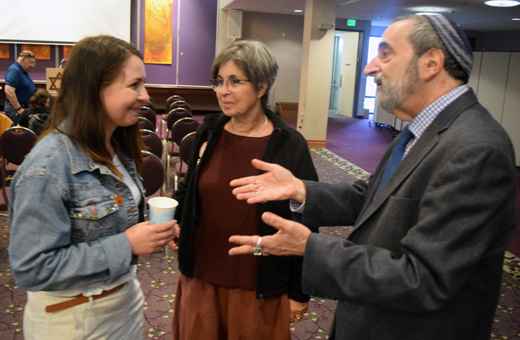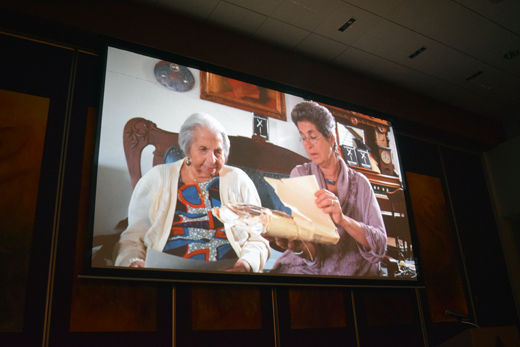SAN DIEGO – A 25-minute documentary on the life of Holocaust Survivor Ruth Goldshmiedova Sax, who recently died at age 90, had its premiere Sunday night at Tifereth Israel Synagogue on a doubly sad occasion. It was Yom HaShoah, which is the annual date for memorializing victims of the Holocaust, and it was the night after a shooting at Chabad of Poway had left one worshiper dead and three others wounded.
Dr. Bill Sperling, a former president of the sponsoring Tifereth Israel Synagogue Men’s Club, led approximately 85 attendees in a moment of silence in memory of slain Chabad congregant Lori Gilbert Kaye before the showing of the documentary, Try to Remember – Never Forget, by Sax’s daughter, Sandra Scheller, and filmmaker Olena Zernychenko.
Those attending the event had to pass through tight security. A San Diego Police cruiser was stationed in the parking lot of the synagogue to demonstrate to any potential evil-doers that law enforcement was closely monitoring this house of worship. A security guard checked bags before admitting anyone through the locked gates of the congregation located in the San Carlos neighborhood of San Diego.
The documentary, mostly filmed while “Ruthie” still was alive, traced her Holocaust experiences including being seized in a roundup in Brno, Czechoslovakia, transported to the Nazis’ “model” ghetto of Theresienstadt, Czechoslovakia; being sent later to Auschwitz, Poland, where she went through six life-or-death selections, and being assigned as a slave laborer in a munitions factory at Oederan, Germany. The documentary then told of her experiences in a Displaced Persons camp, her correspondence and marriage to a distant cousin, Kurt Sax,who had preceded her to America, and her much later efforts in San Diego County to tell the story of the Holocaust while urging people to be positive and loving towards each other.
There were some heartwarming moments in the film, such as when Sax, then in her late 80s, took the Girl Scouts oath – such an experience not being possible for her during the Holocaust years. There was another scene of Sax, in a wheelchair, receiving an Associate of Arts degree from Southwestern College, where she took classes late in life, and a surprise honorary doctorate from the same institution for the work she had done lecturing to diverse groups about the Holocaust. Sax also had received numerous honors from elected officials, including Chula Vista Mayor Mary Salas and State Senator Ben Hueso. A representative of Hueso presented awards Sunday night to Scheller and Zernychenko for the filming of Sax’s life story.

Panelists Olena Zernychenko, Sandy Scheller and Lawrence Baron met before ‘Try to Remember – Never Forget’ was premiered Sunday night.
Following the showing of the movie, Holocaust scholar Lawrence Baron, emeritus professor of history at San Diego State University, led a discussion about some of the subtle points covered in the film that are significant to Holocaust scholars.
For example, in a section of the film, Sax told how she and other prisoners would each contribute a spoonful of soup to a common pot which could be taken to an inmate who was starving. Baron said the significance of this story was that it showed how concentration camp inmates resisted the Nazis’ scheme to pit them against each other in what he called a “Darwinian environment” consisting of “overcrowded spaces, scarcity of food, overwork, and poor sanitation which weakened, sickened, and killed many of the inmates.” Baron said that the Nazis wanted the inmates to steal each other’s food, and “to brutalize other prisoners to win the favor of the guards” in an intentional process of dehumanization.
Another point in the film drawing Baron’s attention was a story that Sax told of the women inmates at night entertaining each other by recalling their favorite foods and trading recipes. He said this was a phenomenon that had been relatively unknown to Holocaust historians before publication by editor Carla Desilva of the book, Memory’s Kitchen: A Legacy from the Women of Terezin.
The professor also remarked favorably on another story told by Sax in which she spoke of how inmates heading to the selection process would try to help each other look stronger and more fit, so as to prevent each other from being sent to the gas chambers.
Finally, the professor remarked upon Sax’s work at Oederan, where she intentionally and at great risk to herself streaked the bullets that she made, in the hope that such action would render them ineffective, and sabotaged bullet making machines.
Overall, Baron suggested, the movie importantly helped to document the small acts of resistance taken by prisoners against overwhelming odds.
It was not lost on anyone in attendance that the same kind of hatred that had propelled the Nazis’ genocidal war against the Jews is still present in the world today – as was demonstrated six months ago at the Tree of Life Synagogue in Pittsburgh, and just this last Shabbat, on the last day of Passover, at Chabad of Poway. Then, as now, people of good will must help one another against those with murder in their hearts.
The documentary will be shown again at 6 p.m. Thursday at the Chula Vista Civic Center Library, 365 F. Street, Chula Vista.
Republished from San Diego Jewish World


























